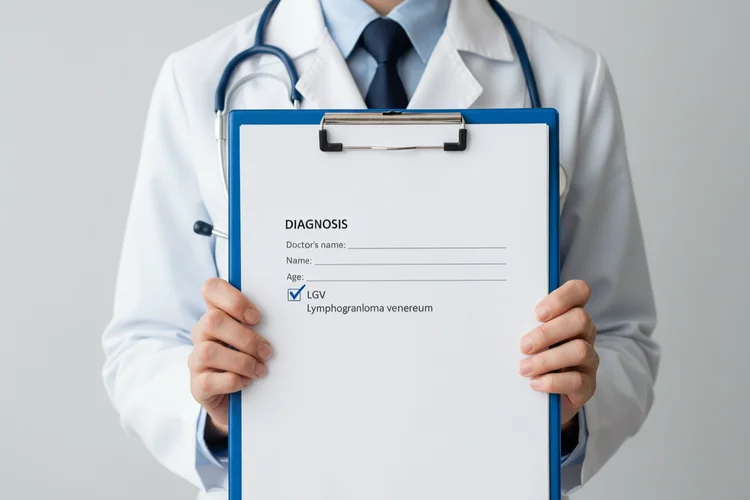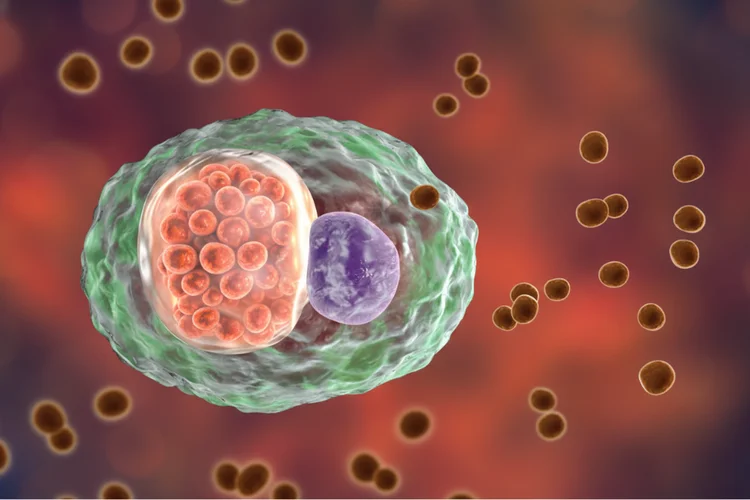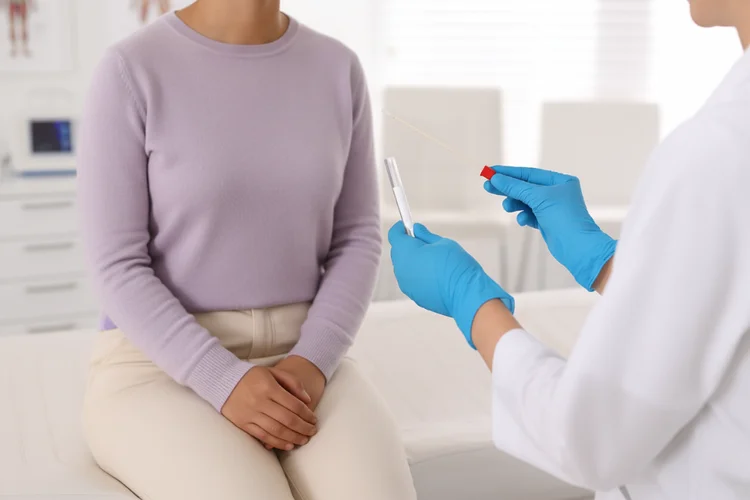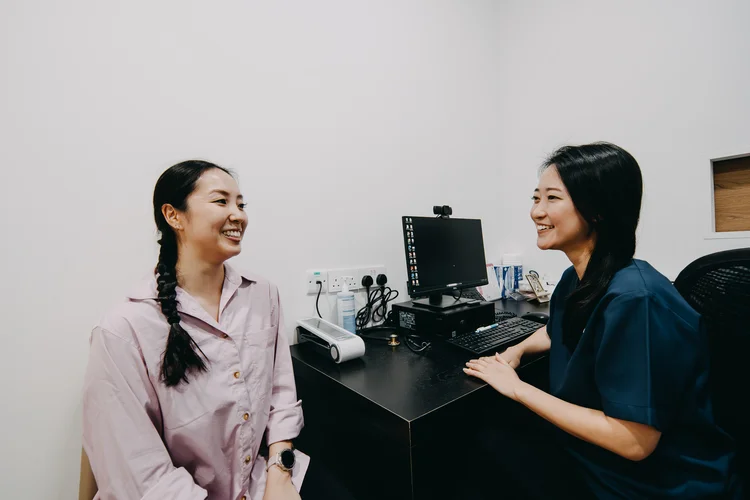Lymphogranuloma Venereum (LGV): Testing & Treatment
| Test Options | STD Screening Packages |
| Treatment | Oral antibiotics |
| Price |
|
| Appointment Options |
Same-day appointment (subject to availability). Book via WhatsApp: 8893 3757 or email: hello@healthscreening.sg |
| Clinic Locations |
Orchard: 1 Orchard Blvd
#05-09 Camden Medical Centre, S248649 Tanjong Pagar: 72 Anson Rd #01-02 Anson House, S079911 |
What Is Lymphogranuloma Venereum (LGV)?
Lymphogranuloma venereum (LGV) is a sexually transmitted
infection (STI) caused by specific invasive strains (L1, L2, L3) of Chlamydia trachomatis.
These strains differ from those that cause common chlamydia infections, as they invade
deeper tissues and affect the lymphatic system. The infection most often involves the
genital or rectal regions and nearby lymph nodes.
LGV occurs more frequently among men and individuals living with HIV. Without timely treatment, it
may lead to chronic inflammation, scarring, and long-term complications that affect genital
or rectal function.

What Are Causes Lymphogranuloma Venereum (LGV)?
LGV develops when the L1, L2, or L3 strains of Chlamydia trachomatis enter the body through contact
with infected secretions during sexual activity. The bacteria gain access through small
breaks in the skin or mucous membranes, allowing infection of the deeper lymphatic tissues.
Common modes of transmission include:
- Vaginal, anal, or oral sex with an infected partner
- Contact between mucous membranes and contaminated secretions
- Sharing unclean sexual devices or using them without barrier protection
Unlike non-invasive chlamydia strains that remain localised in the genital tract, LGV strains can travel through lymph channels, resulting in swelling and inflammation in surrounding areas.

What Are Symptoms of Lymphogranuloma Venereum (LGV)?
The symptoms of LGV vary by stage and the site of infection, typically appearing 3 to 30 days after exposure. The illness progresses through 3 recognised stages:
| Stage of LGV | Symptoms |
|---|---|
| Primary stage | A small, painless sore or ulcer develops at the site of infection, such as the genital area, anus, or mouth. It usually heals unnoticed within a few days or weeks. |
| Secondary stage | The nearby lymph nodes, especially in the groin, become swollen and tender (inguinal lymphadenopathy). Rectal involvement may cause pain, discharge, or bleeding, and some individuals experience a constant urge to pass stools. General symptoms like fever, fatigue, or muscle aches may also occur. |
| Tertiary stage (late complications) | Persistent inflammation may lead to scarring, genital swelling (elephantiasis), rectal narrowing (strictures), or the formation of abnormal passages known as fistulas. |
If untreated, LGV can cause irreversible tissue damage and chronic discomfort affecting sexual and bowel function.
How Is Lymphogranuloma Venereum (LGV) Diagnosed?
Diagnosis of LGV relies on both clinical evaluation and specialised laboratory tests. Your doctor may first review medical history and symptoms to determine whether LGV testing is warranted. Confirmation is achieved through:
- Nucleic acid amplification tests (NAATs) – Detect Chlamydia trachomatis in swab or urine samples from genital, rectal, or oral sites.
- Genotyping or molecular analysis – Performed on the same specimen that tested positive for C. trachomatis to identify whether the strain belongs to the LGV types (L1–L3).
- Serological testing – Blood tests that identify antibodies to the bacteria, often used when advanced molecular testing is unavailable.
A combination of clinical findings and test results ensures precise diagnosis and guides appropriate treatment.

How Is Lymphogranuloma Venereum (LGV) Treated?
LGV is curable with antibiotic therapy targeting Chlamydia
trachomatis. Doxycycline is typically the preferred
medication and is usually prescribed for an extended duration to ensure full eradication of the infection.
For individuals who cannot take doxycycline, including pregnant patients, alternative antibiotics may be
considered. Completing the entire prescribed course is essential even if symptoms subside
early.
After treatment, follow-up testing is often advised to confirm that the infection has
cleared. Early management prevents complications and reduces the risk of transmission to sexual partners.
How Much Does Lymphogranuloma Venereum (LGV) Testing & Treatment Cost?
At healthscreening.sg, confidential STI and LGV testing is available, with treatment options offered when necessary. Our prices as follows:
| Test / Treatment | Test Type | Price* |
|---|---|---|
| Consultation | From $49.05 | |
| Testing | ||
|
Genital Ulcer PCR Testing (7 tests) Herpes Simplex Virus 1 and 2, Haemophilus Ducreyi (Chancroid), Cytomegalovirus, Lymphogranuloma Venereum, Treponema Pallidum (Syphilis), Varicella Zoster Virus |
Swab | $318 |
|
Enhanced Genital Ulcer Testing (18 tests) HIV, Syphilis (swab + blood test), Hepatitis B, Hepatitis C, Chlamydia, Gonorrhoea, Mycoplasma genitalium, Mycoplasma hominis, Trichomonas, Ureaplasma parvum, Ureaplasma urealyticum, Herpes Simplex Virus 1 and 2, Haemophilus Ducreyi (Chancroid), Cytomegalovirus, Lymphogranuloma Venereum, Treponema Pallidum (Syphilis), Varicella Zoster Virus |
Blood + Swab | $538 |
| Treatment | ||
| Oral Antibiotics | From $1.09 per tab | |
*All prices are NETT and inclusive of GST.
We also offer a range of STI screening packages
for comprehensive sexual health assessment. You may choose to see either a male or female doctor based on
your comfort and preference.
For more information or to arrange an appointment, please contact us.
How to Prevent Lymphogranuloma Venereum (LGV)?
Preventing LGV involves adopting safer sexual practices and maintaining regular STI screening. Recommended preventive actions include:
- Using condoms correctly during vaginal, anal, and oral sex
- Getting tested regularly, particularly if engaging with new or multiple partners
- Discussing STI history and testing status with partners before sexual activity
- Limiting sexual partners and avoiding anonymous encounters
- Cleaning and using barrier protection for sexual devices
Book an Appointment for Lymphogranuloma Venereum Testing
Why Choose Us?








Navigate Easy With Google Maps
Health Screening Singapore (Anson House)
Nearest MRT: EW15 Tanjong PagarHealth Screening Singapore (Camden Medical Centre)
Nearest MRT: TE13 Orchard BoulevardHealth Screening Singapore (CPF Jurong Building)
Nearest MRT: NS1/EW24 Jurong EastFrequently Asked Questions (FAQ)
Lymphogranuloma venereum (LGV) is not a virus but a sexually transmitted infection caused by specific invasive bacterial strains (L1, L2, L3) of Chlamydia trachomatis. Unlike common chlamydia infections, these strains invade deeper tissues, including lymph nodes in the genital and rectal regions. If left untreated, LGV can cause inflammation, swelling, and eventually lead to scarring or tissue damage.
LGV often begins with a small, painless sore at the site of infection, which may go unnoticed as it heals quickly. As the infection progresses, however, it can cause pain and swelling in the groin, rectal discomfort, or tenderness in affected lymph nodes. The level of pain varies depending on the infection stage and site. If you experience persistent genital or rectal pain, it is advisable to seek medical evaluation for proper diagnosis.
LGV can be detected through specific laboratory tests that identify Chlamydia trachomatis and confirm whether the strain belongs to the LGV types (L1–L3). Standard STI panels may not always distinguish LGV from other chlamydia infections, so specialised molecular or genotyping tests are often required. If you have symptoms or suspect an LGV infection, it is advisable to request targeted testing through your doctor.
Yes, LGV is a bacterial infection that can be cured with appropriate antibiotic treatment, typically doxycycline taken over an extended period. Completing the full course of prescribed antibiotics is crucial to ensure complete eradication and prevent complications or transmission. Follow-up testing is often recommended to confirm recovery. If you are experiencing symptoms or suspect an LGV infection, it is advisable to consult your doctor for diagnosis and treatment.
The first stage of LGV is marked by the appearance of a small, painless sore or ulcer at the site of infection, usually on the genitals, anus, or mouth. This lesion often heals quickly, which can make early detection difficult. Because symptoms may be mild or unnoticed, routine STI screening is important after potential exposure. If you suspect recent contact with an infected partner, it is best to seek prompt medical testing.
LGV is unlikely to be transmitted through kissing, as the infection typically spreads via direct contact with infected genital or rectal secretions during sexual activity. Transmission through the mouth is rare and would usually require contact with open sores or mucous membranes exposed to infectious fluids. If you experience oral or genital symptoms after potential exposure, it is advisable to consult your doctor for evaluation and testing.
Regular chlamydia cannot turn into LGV, as they are caused by different strains of Chlamydia trachomatis. LGV results from invasive types (L1, L2, L3) that can infect deeper tissues, whereas common chlamydia strains mainly affect surface cells in the genital tract. Although both are bacterial infections, their behaviour, severity, and potential complications differ. If you test positive for chlamydia, your doctor may recommend follow-up evaluation to help determine whether LGV-specific testing is needed.
LGV is not a lifelong infection and can be cleared completely with appropriate antibiotic treatment. Symptoms usually improve within weeks, but full recovery depends on early detection and adherence to the prescribed treatment course. Untreated infections may persist and cause chronic complications. Always follow your doctor's instructions during and after treatment to ensure the infection is fully resolved and to reduce the risk of recurrence.
While both infections are caused by Chlamydia trachomatis, LGV involves different bacterial strains that invade deeper tissues and lymph nodes. This can lead to more severe symptoms such as swollen lymph nodes, rectal inflammation, or scarring, unlike typical chlamydia infections that often cause mild genital discharge or discomfort. Because the two conditions require different treatment durations, accurate diagnosis through genotyping is important for effective management.
The most effective way to prevent LGV is through consistent condom use during vaginal, anal, and oral sex, as this reduces contact with infectious secretions. Regular STI screening, especially for individuals with multiple or new partners, further lowers risk through early detection and treatment. Open communication about STI status and practising safer sex habits also help prevent transmission. It is advisable to undergo routine testing if you are sexually active.
